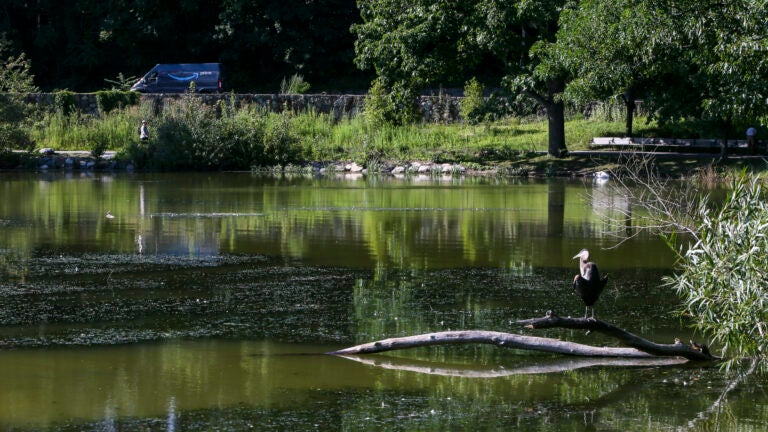Jamaica Pond is closed due to harmful algae bloom
Local News
Boston health officials are urging parkgoers and their dogs to avoid contact with the water.

Boston’s Jamaica Pond will be closed until an algae bloom that produces toxins that can make people and pets sick disappears.
City health officials announced the pond’s closure to water activities on Friday and urged anyone visiting the park to avoid contact with the water and any areas of algae concentration, even if onshore. During the closure, swimming, fishing, boating, and other recreational activities on the water will not be allowed.
People should also not allow their dogs to swim in or drink the pond water, according to the city.
Officials advised that any people or pets who come into contact with the blue-green algae, also known as cyanobacteria, should rinse off immediately. The dull green discoloration from the bloom could be confused with otherwise safe pond water, according to the city.
“For humans, the primary concern is ingestion of water containing blue-green algae while swimming,” the Boston Public Health Commission said in its Friday advisory. “Direct skin contact with the blue-green algae and inhalation of water droplets containing blue-green algae or toxins is a secondary concern. For dogs, the primary concern is the ingestion of water containing blue-green algae or scum that has washed ashore or gotten onto their skin or fur.”
Contact with cyanobacteria can irritate the skin and eyes, while inhalation can cause respiratory irritation and exacerbate pre-existing respiratory conditions, according to the city. If it is ingested, it can cause vomiting and diarrhea.
The impacts can be more serious, particularly for small pets due to their smaller body weights, the health officials said.
“Ingestion of the toxins can cause acute gastrointestinal distress and, depending on the specific toxin, can affect the functioning of the liver, kidneys, and/or neurological systems and in severe cases can result in death,” the city said.
A veterinarian should be contacted immediately if your dog has been around an algae bloom and shows symptoms, including vomiting, staggering, drooling, or convulsions.
“Dogs have been known to eat the scum that washes ashore and/or lick scum out of their fur,” the city said. “In Massachusetts and in many other states, canine deaths have been documented due to the ingestion of harmful algae.”
The Boston Public Health Commission said the bloom could last for weeks or disappear “quite quickly.” Water sampling, in partnership with the state Department of Public Health, will determine when the pond can be reopened.
Newsletter Signup
Stay up to date on all the latest news from Boston.com